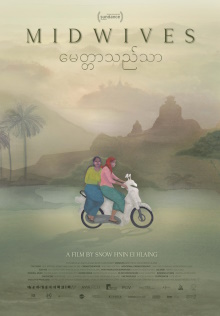The ongoing Rohingya refugee crisis is one of the worst humanitarian disasters of our time and certainly Malaysia is among the countries affected, yet there is still a paucity of films on the subject. This documentary focuses on the relationship between two women, Hla, a Buddhist Rakhine midwife, and Nyo Nyo, her Muslim Rohingya apprentice. This is a ground-level view of their daily lives filmed over a number of years and doesn’t have much in the way of a broad overview of the Rohingya people. I found the unfiltered and raw point of view invaluable and it helped me understand the tension of living as a Rohingya in Myanmar.
From her house and makeshift clinic, Hla serves as a midwife and doctor to a mainly Muslim Rohingya community. Nyo Nyo is an assistant that she trains and she is allowed to touch only the Muslim patients and never the Buddhist ones. The two have a close relationship and Hla obviously cares for Nyo Nyo. Yet that doesn’t stop her from being racist towards Rohingya in general or using pejorative language against Nyo Nyo in particular. For example, she calls the latter ‘kalar’, a term that apparently refers to the dark color of their skin and which Nyo Nyo hates, and accuses her of being a bad student who is only in it for the money. Over time the persecution against the Rohingya in Rakhine state ramps up and they are aware of fighting between the rebel Rakhine Army and the Myanmar Army. At times, Hla’s clinic is ordered to close and to stop treating Rohingya, but their lives don’t seem to be directly affected by the violence. At one point, Hla wants to travel to Yangon where her sister lives, though she would have to pay someone to smuggle her there. She changes her mind after becoming pregnant and works instead to build a clinic of her own.
This documentary proves its unfiltered bona fides early on by showing a very graphic scene of a Rohingya woman giving birth. The director Hnin Ei Hlaing was born in Rakhine state but grew up in Germany. The personal connection was still strong enough for Hla and Nyo Nyo to trust her with these intimate details of their personal lives and it is this authenticity that makes this film so powerful. We get scenes of them shopping for clothes together and Hla encouraging Nyo Nyo that she looks good in a pink outfit. Yet we also get unguarded commentary by Hla of how all Rohingya are like dumb and lazy cows. Nyo Nyo is visibly more cautious and resents Hla to some extent but acknowledges her as her mentor and benefactor. It’s powerfully ironic to see Nyo Nyo finish building her large new clinic building and Hla arrives to criticize her about the organization and placement of her medical supplies. All of the shots of their daily lives were valuable to me, at once so similar to what we know here in Malaysia and simultaneously so different. We see them eating while watching TV, and showing on the TV are song and dance routines that extol nationalism and racial purity. Denied access to government schools, the Rohingya organize their own schools and assiduously stick to the government curriculum including teaching students about Buddhism. The images of Rakhine state are beautiful and there is a palpable sense of loss that it may be impossible to visit these places due to the ongoing violence.
Malaysia has a sizable community of Rohingya refugees and it has always struck me that they are disliked far more than any other immigrant group. As I have no personal contact with them, it’s hard for me to understand why but the common complaint I’ve heard is that they’re entitled and lazy. Watching this however, it’s impressive how industrious both Nyo Nyo and Hla are. As her new building is too big, Nyo Nyo uses half of it as a clinic and turns the other half into a general goods store, running both businesses herself. For her part, Hla also sells fish and buys popsicles from the city to be resold by Rohingya on motorcycles. As they have no access to banking services, they rely on informal credit networks among the villagers and it’s fascinating to watch a scene of a meeting of one such group. Of course neither of the two women have formal credentials for practicing medicine yet it’s evident that the community is extremely grateful to have them as it is certainly better than nothing. There are all kinds of details like this and more, including how Nyo Nyo’s husband who teaches in the community school, enlists the help of little children to help construct her building.
You’d probably want to walk into this documentary possessing already at least some knowledge of the Rohingya refugee crisis as this documentary provides neither commentary nor judgment on the historical background. As someone who is starved for firsthand information on what is really happening on the ground in Myanmar and what life is like for those caught on the frontlines in Rakhine state, I found this to be an extremely valuable film. The view it presents is already outdated as it ends just as the Myanmar Army deposes Aung San Suu Kyi, marking the beginning of the civil war that is still ongoing, but it definitely fills in an important blank for me.
